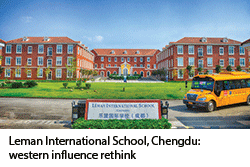 China has long oscillated between the urge to equip its elite with foreign knowledge and skills, and an opposing instinct to turn inward and rebuff such influences. In the 1870s, the Qing imperial court ended centuries of educational isolation by sending young men to America, only for the Communist regime to shut out the world again a few decades later. Today record numbers of Chinese study abroad: over half a million people left in 2015 alone, many for America. The Communist Party officially endorses international exchanges in education while at the same time preaching the dangers of Western ideas on Chinese campuses. A new front in this battlefield is emerging, as the government cracks down on international schools catering to Chinese citizens.
China has long oscillated between the urge to equip its elite with foreign knowledge and skills, and an opposing instinct to turn inward and rebuff such influences. In the 1870s, the Qing imperial court ended centuries of educational isolation by sending young men to America, only for the Communist regime to shut out the world again a few decades later. Today record numbers of Chinese study abroad: over half a million people left in 2015 alone, many for America. The Communist Party officially endorses international exchanges in education while at the same time preaching the dangers of Western ideas on Chinese campuses. A new front in this battlefield is emerging, as the government cracks down on international schools catering to Chinese citizens.
Only holders of foreign passports used to be allowed to go to international schools in China: children of expat workers or the foreign-born offspring of Chinese returnees. Chinese citizens are still forbidden from attending such outfits, but more recently a new type of school has proliferated on the mainland, offering an international curriculum to Chinese nationals planning to study at foreign universities. Their number has more than doubled since 2011, to over 500. Many are clustered on the wealthy eastern seaboard, but even poor interior provinces such as Gansu, Guizhou and Yunnan have them.
Some international schools are privately run, including offshoots of famous foreign institutions such as Dulwich College in Britain or Haileybury in Australia. Even wholly Chinese ventures often adopt foreign-sounding names to increase their appeal: witness ‘Etonkids’, a Beijing-based chain with no link with the illustrious British boarding school. Since 2003 some 90 state schools have introduced international programmes too, many of them in the top high schools of China, including those affiliated with Peking University and Renmin University in Beijing.
New laws are making it harder for such schools to operate. In 2014, Beijing’s education authorities stopped approving new international programmes at public high schools. Several other cities, including Guangzhou, Shanghai, Shenzhen and Wuhan, have also tightened their policies on such institutions. Some have capped fees for international programmes. The ministry of education says it’s pondering a law that would require public high schools to run their international programmes as private entities (fearing this event, a few schools have already begun doing so).
Last November, a new law banned for-profit private schools from teaching the first nine years of compulsory education. That came only days after Shanghai started to enforce an existing ban on international schools using “foreign curriculums”.
Lawmakers say the rules are prompted by concerns about the quality of international schools. The expansion of international programmes within regular Chinese schools also spurred a popular backlash against the use of public facilities and funds to teach pupils who plan to leave China. The move to control international schools is “the next logical iteration” of a wider campaign against Western influences, reckons Carl Minzner of Fordham University in America. In 2015, China’s education minister called for a ban on “textbooks promoting Western values” in higher education.
But lashing out against international schools could prove risky. Any attack aimed at them targets China’s growing middle class, a group that the ruling Communist Party is keen to keep onside. Chinese have long seen education as a passport to success, and it’s not just the super-rich who have the aspiration or means to send their offspring abroad to attend university. Some 57 percent of Chinese parents would like to do so if they could afford it, according to the Shanghai Academy of Social Sciences. Even President Xi sent his daughter to Harvard, where she studied under a pseudonym.